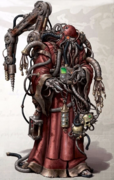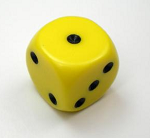|
Arglebargle III posted:Now my heist finale to this adventure is in doubt So don’t heist them. You are wanting to put your players at a specific place at a specific time so that a specific thing that you want to happen happens. That is literally railroading. You should reward the players for being clever. You should also plan on using your encounter in a modified format down the line. Part of sandbox DM-ing is to be like the politician who says, “I must find out where the crowd is going so I can lead them!” Your job is to reward your players for doing fun, interesting things while keeping your arc fluid enough that it can absorb the inevitable PC zigzags.
|
|
|
|

|
| # ? May 18, 2024 04:16 |
|
I made maps for three different final showdowns today
|
|
|
|
Imagine making maps for combat.  My last in-person fight used a battle map with erase-able ink hastily drawn, dice for bad guys and skittles for the fire that was engulfing the library about which the battle was raging. As the fire was doused we got to eat the skittles, so there was a dual incentive to get it extinguished quickly
|
|
|
|
We're playing on roll20 in a nightmarishly rules heavy system so maps are easy, keeping the players abreast of what's happening is hard. I've started putting map tokens down with interactable objects like looming cranes, explosive barrels, thin walls etc. to make combat more dynamic. It's generally been good the only time its bit me in the rear end is I forgot the fight had caused multiple hull breaches and the air had left the room they were in. Someone shot a barrel full of premethium... the player who shot it argued that it was a future space exploding barrel and therefore didn't require oxygen to burn. Arglebargle III fucked around with this message at 17:42 on Nov 22, 2023 |
|
|
|
Arglebargle III posted:. Sounds like you've got a bit of an exposition problem. Players can't act on information they don't have so you don't want to hide important stuff behind checks for to long. Yes, maybe a check can hide some expo untill it's to late to act ... but then you should reveal it anyways. The slow realization of a grave mistake can be an excellent moment in the campaign. I say ditch the set piece encounter because you have something even more valuable to gain. Let the sister gloat, or have a lackey spill the beans as the party is leaving. Taking a big loss will actually set up the sister as a great villain and the party will immediately want to scheme payback. Roll that energy into the next campaign arc. Your players will have much more sustained energy over getting burned than a single cool encounter (which you might be able to reuse later anyhow).
|
|
|
|
As usual after building out three possible final showdowns my players flew their ship so good and conducted diplomacy so reasonably that they didn't need to do any ground combat at all. I think my players are finally grasping the concept that they ARE Imperial law on the frontier. They are taking to the arbitrary and cruel behavior appropriate for the setting. Blessed are the merciless etc.
|
|
|
|
That happened to me two weeks ago: In my Cyberpunk 2020 mini campaign my players were to do a daring high speed hijack of a tractor-trailer rig to steal some swanky cargo. They had planned an epic ambush with tons of the old ultra violence the session before so this time we were house going yo jump right in. Only right as the PCs were rolling out one of the players says, “wait. There’s a computer in the truck, right?” “Sure,” says I. “The ECM, sometimes called the ECU.” “Well if I buy an EMP grenade, won’t that thing fry the computer and stall the engine?” “Uh…” So instead of a high speed gun fight, the players pulled off to the shoulder in a stolen U-Haul truck, tossed the grenade, walked over to the truck with a satchel full of gold and bribed the driver and co-driver to get out. They then skimmed the best cargo out of the trailer, dropped off the bound and blindfolded drivers at the next rest stop, and went on their merry way without a single shot being fired. Sometimes a win is a win.
|
|
|
|
I find myself wanting to play Dark Heresy in the style of Paranoia: nobody is allowed to know the rules, everyone is a secret heretic, and the inquisition gives you unreasonable objectives.
|
|
|
|
gently caress yeah
|
|
|
|
I'm running a lot of PbtA mystery stuff right now (Brindlewood Bay, The Silt Verses) and it's tons of fun, but there's one aspect I'm really struggling with. In Carved by Brindlewood games, the players' successful investigative rolls - investigating crime scenes or talking to suspects - lead to them gaining Clues - essentially, narrative currency. There's no canonical solution to the mystery; instead, the players roll to confirm their final theory, applying relevant clues as positive modifiers to their roll. (In one sense, it's a play-friendly form of confirmation bias - the longer the players spend snooping around the old billionaire's mansion because they think he's suspicious, the more likely they are to find clues that point to him as the killer.) It's actually a brilliant mechanic in a variety of ways: it encourages creativity and inventiveness, it prevents dead-ends, it keeps the players moving forwards and lends some solid narrative structure to the mystery. My challenge is the threshold of when a conversation becomes a Clue. In true PbtA fashion, the games encourage you to make rolls meaningful - so the players shouldn't be rolling to rack up Clues repeatedly in a casual conversation, and there should always be meaningful consequences of a failure or a mixed success to keep the story moving forwards. This works great in risky situations, but I'm struggling with how PbtA's fiction-first approach works during casual / safe conversations where there's no justifiable risk (for instance, stopping in to chat with an octogenarian shopkeeper to learn more about the lay of the land). What I'm finding is that I end up performing NPCs as cagey and unforthcoming in conversations in order to avoid giving out unearned Clues when there's no risk and nothing meaningful at stake - and as a result players end up quizzing them for *longer* and getting frustrated in the process rather than moving on with the investigation. I'm thinking the best go-to might be to come up with a bank of outside interruptions that can organically occur when the players are dragging their feet questioning a single NPC? Perhaps keep a 'dangerous' character back who can appear if the player rolls badly during the questioning, rather than making the friendly NPC turn on the players...?
|
|
|
|
I don’t know the system, but a basic tenet of most good RPGing is to say yes or roll. In other words, once the players get the two available clues out of the kindly codger at the hardware store, then don’t roll anymore. Just have him admit he doesn’t know anything more about the abandoned amusement park, but boy howdy it’s been good alfalfa growing weather lately. (Or if the NPC doesn’t know anything, don’t roll in the first place and make it obvious he knows nothing.) There has to be something at stake for a roll to take place, right?
|
|
|
|
I don't know Brindlewood bay too well, but the usual PbtA advice for this is to make offscreen moves in response to "low risk" misses. Advance a front, basically. Move the camera somewhere else and make it clear that Real Stuff is happening. Kill off a major NPC if you have to. Players are never "safe" to gently caress around and game the system, because the GM can make as hard a move as they want to (in service of making the world exciting and scary, not to punish)
|
|
|
|
Has anyone played Mothership? It's my groups annual holiday hiatus, abd the few of us left want to try some smaller games. We want to do a side story to our sci-fi/fantasy 5e campaign, and Mothership seems like a great way to do a few sessions as regular normal people in the world.
|
|
|
|
Mothership is pretty great, good for one shots but not campaigns. Most players will have fun getting themselves killed in a one-shot but even a short campaign will likely suffer from them getting a whiff of trouble and deciding to get into their spaceship to GTFO. Make sure to keep the special rules for the various classes in mind, they get easily overlooked in the heat of the moment!
|
|
|
|
Shanty posted:I don't know Brindlewood bay too well, but the usual PbtA advice for this is to make offscreen moves in response to "low risk" misses. It’s perfectly valid to delay your hard/soft move until you think of something. It might be a few minutes before the players get out of the antique store and you realize that their car should be ticketed (or booted).
|
|
|
|
This sounds interesting. Explain to me GM hard/soft moves.
|
|
|
|
Arglebargle III posted:This sounds interesting. Explain to me GM hard/soft moves. As I understand it, soft moves are tee-up reactions by the GM that still give the player an opportunity to avoid dire consequences ('the police officer angrily draws his gun and tells you to raise your hands') compared to hard moves where the consequences are immediate ('the police officer places you under arrest'). Thanks to people who answered, delaying the move until the scene ends and finding a consequence in the delay - a parking ticket, nightfall, slashed tyres or being spotted by a villain - definitely makes the most sense! PbtA really feels like a breathless, ever-rolling experience of invention for the GM, which is both exhilarating and a little intimidating. grobbo fucked around with this message at 15:38 on Dec 4, 2023 |
|
|
|
grobbo posted:I'm running a lot of PbtA mystery stuff right now (Brindlewood Bay, The Silt Verses) and it's tons of fun, but there's one aspect I'm really struggling with. It's not a clue until they start Meddling, and Meddling is a thing with a fictional trigger, same as in most PbtA games. Trying to get a clue out of a conversation might mean charming someone into revealing something they hadn't planned on, or connecting the dots between details that they didn't think were significant, or keeping your cool in the face of threats until their bluster gives out. And those things can be possible, or they can not be. If they stop in at the five-and-dime at the base of Observatory Mountain and literally all the good poo poo is somewhere up on Observatory Mountain or at least not down here at the five-and-dime, if the five-and-dime's just here for color and maybe some foreshadowing, then you do what is known in the business as address the characters, not the players. "What are you trying to do, exactly? [...] You start to turn on the charm but nothing really changes about Mr. Boline's demeanor. He's been as open with you as he could already, there's nothing hiding here. [...] It is maybe a little odd that Dr. Stern would stop in for a seltzer on his way up the mountain and a tin of tobacco on his way down, but you can't just connect those dots here, you need more information - you'd need to either poke around up the mountain or risk trespassing in Dr. Stern's house again." The mavens know what it looks like when they're getting information, and they also know what it looks like when they're not, so you can definitively tell them there's nothing here in ways they can understand.
|
|
|
|
Arglebargle III posted:This sounds interesting. Explain to me GM hard/soft moves.
|
|
|
|
Ilor posted:How familiar are you with Powered by the Apocalypse rules systems? Like, is it the GM moves you'd like more detail on, or what constitutes hard/soft, or both? Do both. Does anyone have any one sheets that they like for oners? I might take advantage of people being in town for the holidays to run a one shot and I want everything to be as minimal and straight into it as possible because there absolutely won't be a session 2.
|
|
|
|
Arglebargle III posted:This sounds interesting. Explain to me GM hard/soft moves. It's how a game works, right? You take turns; you make a move, then your opponent makes a move, and so on and so forth. Except this is an RPG, so you're all telling a story, and what you do to wrap up your turn is to put something in the story "your opponent" has to respond to. For players, making a player move and rolling the dice usually gives the GM a result they they have to narrate into the world. But the GM doesn't roll dice. The "GM Moves", then, are ways that the GM wraps up their narration and prompts the players into taking action. Most PbtA games will have a genre-appropriate list of prompts to draw from. Here are the ones for Apocalypse World, the post-apocalypse drama game. quote:
And here are the ones from Brindlewood Bay. quote:
Mavens are player characters - "show a Maven being killed" is not as bad as it sounds, since similar to Blades in the Dark they have access to a "resistance mechanic" that lets them step down or walk back consequences they don't want to face. The list is shorter for a couple reasons - first, it's intended to grow as the Mavens solve smaller mysteries and see more of the big one underneath; and second, the overall dramatic scope is smaller than Apocalypse World. What's the difference between "hard" and "soft"? They're points on a spectrum, and what the whole thing is measuring is "how permanent the GM's change is". Separated people can come back together, but people die when they're killed, you know? And how permanent a mark you leave has to make sense in terms both of how the scene is set and how successful the players are within it. So, having a chainsaw-wielding maniac show up isn't very appropriate when you get a mixed success talking to a friendly gardener on the streets at noon, but gets much more appropriate for a hard failure trying to find a critical clue in a private garden maze in the dead of night.
|
|
|
|
Dameius posted:Do both. If people enjoy Star Trek / space opera parody, Lasers And Feelings is great as a low/zero prep game where people can be silly and creative. http://www.onesevendesign.com/laserfeelings/
|
|
|
|
Dameius posted:Do both. "He levels his SMG at you and says 'Don't you fuckin' move!' What do you do?" (soft) and "He puts a three round burst into you, center mass. Your body armor absorbs the worst of it, but at the very least you're gonna have cracked ribs and some internal bleeding. Take a point of Harm and make the Harm move for me. OK, now what do you do?" (hard) There are situations in which either approach is called for, as dictated by the game's rules. One of the nice things about the GM moves is that (in general) they are stuff you were going to do anyway. The first example is "put someone in a spot," the second is very much "inflict harm (as established)." And one can be used as the "set-up" for the other. So for instance, you as the GM might use the first sentence, maybe as the result of a failed player roll to act under fire to sneak past the SMG-armed guard. This changes the situation, in a way that narrows the PC's options but still gives them the chance to avoid getting shot. If the PC gets cute and tries something that is anything other than standing still or maybe trying to fast talk their way out of the situation, you can use the second sentence immediately, as you have already established that the NPC has the drop on the PC and is ready, willing, and able to drop the hammer. Note that you are not preventing the PC from taking any course of action - the player could say "I quickdraw my pistol and ventilate this motherfucker." You're just doing your due diligence as the GM to set up the situation, to say, "OK, you can do that, but you're gonna get shot a lot in the process. You still want to do that?" This leaves character agency in the hands of the player, but modulates and communicates the risk/reward for whatever it is they're going to attempt. Does that help?
|
|
|
|
Ilor posted:Glazius hit the basics, but to expand on the difference between hard and soft, think of "soft" as narrating something that's about to happen and "hard" as narrating something that has already happened. It's the difference between: i'm running blades at the moment and it's weirdly freeing to just say 'he stabs you right in the belly, level three harm 'impaled' and the system accomodates that, partly because if that's happened it's a natural consequence of everything that's gone before and also there are a bunch of ways the players can deal with that kind of direct statement (resistance rolls, flashbacks, etc). you'd think it just makes everything a magic tea party where you just say whatever but it really doesn't.
|
|
|
|
So in my first game I'm DMing (5e dnd) my players have bungled a heist pretty badly and gotten themselves kinda in over their heads, but have let themselves a bit of a parachute and I'm still working on how to best run things before our Saturday session. Its a large party of seven players, three long time veterans and four people on their first campaign. They had a plan to steal a device that they've essentially been escorting since the start of the campaign. They're level 5 now and the first lvl1 session began with them all meeting each other as guards for a caravan carrying this device. My previous posts explain in a little more detail the conceit of the world, but basically no new souls enter the world, so the souls of the dead end up in limbo and new babies need to have a soul pulled from limbo and put into them by a necromancer, the older they are the harder it is to do. The device is supposed to be able to bring a soul into any person of any age. They were supposed to deliver this device from the specialist who manufactured it to the wizard who contracted it to be made, Erris Bliane. When they got there, they found that she had wasn't there. She came from a wealthy merchant family who wanted her to marry into more wealth instead of pursue her passion for research. Instead she used her magic mirrors to abscond with most of the family fortune to "pirate island" aka weird libertarian council land, where a patron allowed her to set up a lab where she could activate her device. Most of the fortune went to paying for it (the party collected the payment and then jumped on the ship to the island without ever passing it on the artisan). Once on the island the party pursued a bunch of subplots and have created ample chaos in local politics. Erris' patron is one of the members of the island council, a powerful war wizard named Barossu from the southern deserts of the main continent. The party has been in communication with Erris as they go, and she's gotten nervous about her deal due to ambiguous worries. They have also met up with a bronze dragon and explained their presence on the island with the story of the device. The bronze dragon is excited by the good that could be done in the world with the device, and the party has agreed to *ahem* negotiate for it and bring it back to the mainland, where a temple could be established to utilize it's healing power and help the soulless. The party has elected to steal it outright, with inside help from Erris. For the heist, the party hired a ship and crew from four options, each with a cost, brief statement, and the guild they serve for information. The party chose a low cost crew from a rival wizard guild. Once at Barossu's compound, they managed to convince them to stay below decks and wait, at first. The other ship in the harbor is the one they rode to the island on in the first place, and the druid is madly in love with a crew member, a byproduct of home-brew rules surrounding the soul recycling mechanic. Because they knew Erris' specialty was enchanted mirrors they came to the harbor under the conceit that they were delivering a new mirror for her and hauling an old one away, and it worked. They fooled the harbor master into taking them upstairs via elevator with his guild symbol (wizard key card). From there the wheels started to come off. They got to Erris' room with the basic mirror and switched it for her magic mirror into their crate, important to them for a separate heist subplot they're trying to execute simultaneously. However, the harbor master and his stooge stayed with them and they failed a lot of deception checks with him, repeatedly. The paladin, of all people, decided to try and knock him out and boogie. Bad checks all around and now the fortress's magical defenses are active. This is point where the druid sent her owl familiar out the window to the dragon's ship, waiting well off shore to escort the party to the mainland, to let him know that things had gone south. At this point, the druid climbs out the 3rd story window and transforms into a giant spider, then the the rogue rides her away over the walls and down the cliffs to the harbor cave. The rest of the party bumbles around in the hallways fighting off wizards and defenses before deciding to make a quick effort at grabbing the device from the lab on the next floor up and getting out of there. The bard uses a scroll of Disguise Self to look like Barossu. They've met him once before and it's effective enough to get them to the lab, get the device, and start moving back downwards. However, with the whole fortress on full alert they run into the real Barossu. His escorts are confused and there's hectic combat. The bard gets hit with feeblemind (he's one of my closest friends and helping to mentor new players in this campaign, so he's thankfully having some fun roleplaying it). The party does enough damage to break Barossu's disguise and reveal him to be a Rakshasa (a holdover from local politics plots that the party never engaged with). Combat is now very hectic. Meanwhile downstairs the druid and rogue have started a separate mess. The rival wizards crew were incited to start a distraction and have basically started the entire harbor on fire fighting the other ship's crew. The druid kidnapper her crush as a giant spider and professed her lover, which went very badly and left her heartbroken and bitter. The rogue got occupied robbing the barracks blind and eventually got both of them into a ritual room where magical defenses are powered from, and now there are wizards casting lightning bolts in a small area. Back upstairs the rest of the party is starting to take way too much damage, even with confused fortress wizards attacking Barossu as well. Barossu is splitting betrayer wizards into devils with a gory spell with a telegraphed multi-turn cast. I could target party members with it, but I haven't yet just to be a little merciful. The barbarian now believes he cannot be killed, because he's been knocked unconscious enough times and he always just gets brought back up again. He is behaving accordingly. This was supposed to be an in and out stealth mission. If the party tries to power through all three phases of the Rakshasa fight while split up with some fortress defenses and everything else, I'm almost certain most of them will die. Do I explode one in a shower of gore to spawn devils if their HP gets too low (with saving throws and an opportunity to interrupt the spell of course)? At what point do I bring the bronze dragon in, and how do I do it? I hadn't planned on him getting involved, but they did reach out to him for help as soon as things started getting bad. I want to reward foresight. I feel like I have the fate of the campaign/my party's lives in my hands, and I want to make sure they both feel the real risk of loving around and don't find out so much that it's not fun for them.
|
|
|
|
If they get into a jam, let the bronze dragon rescue them. But perhaps the dragon demands tribute of some kind for saving their bacon. Make it clear that the dragon will not be treated as an “easy win” button and demands a service for service agreement. Make the repayment something serious and expensive enough (in time, materials, other resources) that the PCs will balk at asking the dragon for a favor again any time soon.
|
|
|
|
If things get really rough, the party is wiping, and you can't justify the bronze dragon flying around to seven different places picking up the bodies and saving everyone, I'd lean into the result; you could actually pull a really fun Hail Mary with the lore you've established. The party wipes, the PCs die - and then they wake up far away, in the wrong bodies. (Depending on what's most fun, it could be imps or other low-level creatures, or even children if that's not too grim) A powerful necromancer, who's *also* after the device and has been observing them from afar, has brought their souls back from limbo into temporary vessels. The necromancer argues that Erris deliberately sent them into harm's way (it does sound like she's been doing a lot of playing all sides from your description), and they should work together to seize the device - but first they'll have to carry out a rather more urgent heist in their weakened forms to reclaim their bodies (from the depths of the sea? from the rival wizard? up to you). That way you can progress the story meaningfully off the back of the failure and there is a consequence for their recklessness, but it's a fun one. grobbo fucked around with this message at 10:43 on Dec 7, 2023 |
|
|
|
Good suggestions so far. Other things to consider: - What's the Barossu rakshasa's impetus for sticking around at this point? It seems like with his cover blown and some of the guard turning on him, he might choose to vanish, consider his options, and swear revenge on the party - maybe this provides an opportunity to convince the guards they were doing the right thing all along? - What's Erris doing right now, and are things sufficiently disrupted that she's likely to lose the favor of her patron (assuming the real Barossu is still alive somewhere...); if so, does she have any research projects that might be useful in an escape? - Would a fire in the harbor divert anyone from guarding the compound, maybe to protect a shipment of volatile magical reagents or something? - Would letting off destructive magic willy nilly in a defense control room impede the defenders in any way? - Rescuing the party seems fairly in character for a Bronze (although it might be peeved if they did some ethically questionable things when the heist went off the rails). Could it raise an obscuring fog off the sea and turn a climactic flight into a climactic stealth exit or chase?
|
|
|
|
Thanks for all the input everyone! To answer a few questions: -A part of the fortresses' defenses are huge murals on the walls depicting Barossu defeating powerful foes. The souls of those foes are trapped in a gem embedded in the mural, and when the defenses are active they sort of peel out of the walls and attack, and will keep coming back when killed until the gem is shattered. -The Rakshasa came into play at some indeterminate point in the past when Barossu had tried to summon him, not realizing he was getting in over his head. He wanted to capture and control to devil to secretly assail rival council members. The Rakshasa killed him (and trapped his soul in a gem mural in the top floor penthouse? The party hasn't gotten up there and probably never will now, but it's a neat feature). In getting pulled to this plane, he lost his position in hell and now needs an army to invade hell and reclaim his throne. The device will allow him to remove souls en-masse, creating an army of soulless soldiers that he can use to invade hell. His motivation for sticking around is to fulfill his plan, no matter how many of his own guards he has to rip the souls out of. -The fire in the harbor is a huge problem and it's definitely drawing a lot of attention. The other ship was carrying a ton of families with soulless members who have been brought with the promise of their family members getting a soul. The reality is they were all going to be made soulless and twisted into a devil army. The party's ship's crew are lighting everything on fire. Their guild leader invented Firestorm, and its very much their style. Between ushering the refugees away from the harbor and putting out the burning ship and now buildings, most of the fortresses' wizards and guards are occupied there, and they assume that's why the castle's defenses were activated in the first place. -Erris is trapped at the bottom of the elevator shaft/staircase on the main tower part of the fortress with the party's dwarven necromancer and the device. The main combat is happening just outside the elevator doors. She's an incredible coward in combat, "I'm just a laboratory mage!" The shaft is filling up with water, and rather than help the necromancer break down the door and rejoin the fight, she's dispelled the wall of force blocking the stairs and was going to flee upwards. The necromancer has made a rousing speech, and she'd paused briefly to reconsider right before the session ended. I kind of like the idea of the party's souls getting trapped in limbo. They could be stuck in the fortress with the souls of everyone else Barossu/the Rakshasa have ever made into mural, including the Barossu himself, and have to figure out a way back into their bodies. They can solve the puzzle and pop back out just in time to be marching towards a portal to hell. Or just as the bronze dragon bears down on the fortress. Time can move funny in limbo if I want it to. This kind of feels like a nuclear option, but the party did get themselves into this mess. It would probably only hit five party members though, leaving me to occupy the other two separately. Unless the Rakshasa activates the device and pulls souls out en-masse. Activating the device is supposed to be time consuming, so I don't think it could happen in combat, but a cloud of something that puts them to sleep or some such could get around that. The device is also very large and heavy, so hard to abscond with on a whim. If the party decides to keep trying to fight it out, that's probably the direction I'll go. If they try to cut their losses and run, I can have the bronze dragon cover their escape. If they get stuck somewhere in between those places, maybe the dragon shows up and starts poo poo, and it's up to the party what to do then. Maybe he escapes with the device himself, maybe he helps the party out, etc. etc.
|
|
|
|
Loving the idea of 40k Troubleshooters and a merciless Friend Inquisitor
|
|
|
|
Okay, I want to poll the audience regarding a question I don't see a strong rule for: In DnD (specifically Pathfinder 1e but I want to hear a broad range of perspectives), when does combat begin? The prompt for this question is when I had a player with the Kensai Magus archetype get sneak attacked by an assassin. The PC failed the perception check, and the assassin was able to sneak up to him undetected from behind. The Kensai archetype has a specific ability which states "At 19th level, a kensai’s initiative roll is automatically a natural 20 and he is never surprised." The player argued that 1) combat began at the initiation of the sneak attack 2) because he can never be surprised, he should have been allowed to roll for initiative prior to the initiation of combat. He would have won this, gone first, and therefore not been flat-footed to the assassin and never have been sneak attacked. I ruled that combat wouldn't have started until after the sneak attack, not before, and therefore rolling initiative doesn't come into play. In retrospect later, I actually like the player's interpretation and should have just let him have the cool moment of turning around to smoothly counter the assassin who had just crept up behind him. But the situation prompted the broader question of when combat starts for PCs that aren't explicitly written as never being surprised. Does it start after an inciting event or before? Pathfinder 1e rules don't actually define what starts a combat. The rules in the combat chapter just say "At the start of a battle, each combatant makes an initiative check." And for surprise it just says "When a combat starts, if you are not aware of your opponents and they are aware of you, you’re surprised." But never defines combat start. This actually comes up more often than you'd think. Does combat start before or after a player says "gently caress it, negotiations are over, I stab the bastard"? Do they get one free hit in, and then combat starts? Or does combat start at their initial intention? When they reach for their blade? You can imagine a scenario where the PC reaches for their blade, but the NPC is quicker to react, rolls a higher initiative, and gets to act before the PC who said gently caress it. Or in the converse, if the PCs quick draw on a tavern patron at the start of the bar brawl, how do they explain that one to the city guard? "No, he hadn't swung at me when I cut him in half, but he was about to, I swear!" My instinct says that allowing the initiating action to occur prior to combat start allows for cool moments, but it also allows weird situations like a PC getting a hit in, then rolling initiative, and maybe getting to immediately go again. Anyone have thoughts on this?
|
|
|
|
I would personally rule it in favor of the combat starting the moment the assassin intended to attack, giving the Kensai a chance to act before the assassin could strike unless the assassin ended up with a higher initiative somehow. The flavor of the ability is that the Kensai doesn't get surprised, I would say getting stabbed in the back is pretty surprising. Most surprise attack situations would happen before everyone is aware they're in combat so I think if you rule that it only works for surprises that happen after everyone has rolled initiative the ability's kind of a dud. Plus I would assume that level 19 abilities are really powerful and being the guy who can't be surprised for any reason feels a lot better than being the guy who has to argue his case for why he's not surprised every time someone suprises him.
|
|
|
|
I would say as the GM it's your responsibility to make the flow of time make sense and adjudicate corner cases in the rules like that. If I had a player who could explicitly never get surprised, I would probably let them go first. It's a cool moment! The assassin doesn't know the PC can never be surprised. The idea that the player can start combat by getting sneak-attacked and then not be surprised strains belief. It may just be GMing a bad system but in general I think rules are kind of dumb. I've also played in a Pathfinder game where the GM knew the rules very well but had no sense of storytelling, leading to weird interactions. For example, the party was hit with a random storm encounter on a ship at sea. As a pirate druid type character, I summoned a dolphin to aid a drowning NPC. The dolphin faffed around ineffectually for 6 seconds and then disappeared. There was no clear rule for a dolphin helping a drowning man, but the combat rules clearly said it disappears after a single round. It was a confusing and disappointing moment as a player -- this was a scenario that my ability to summon animal allies should have been a perfect solution for, but instead the party ended up taking a bunch of swim tests. Arglebargle III fucked around with this message at 04:22 on Dec 10, 2023 |
|
|
|
+1 for letting the player have their cool moment. Though to stretch this ability to the breaking point, do you think it works akin to a spidey sense around them such that if the assassin were targeting someone in the party near them and in line of sight, would this PC get a chance to react to potentially intercept the assassin before they strike?
|
|
|
|
I appreciate the input. And I wouldn't quibble over the text of the rules so much either were it not for the fact that while combat start isn't defined, surprise is. Surprise is defined specifically as not being aware of your opponents at the start of combat. Whoever is not surprised gets to take an action in the surprise round. So the Kensai ability could be more specifically interpreted as "you always get to act in a surprise round." And a surprise round hadn't started yet if combat hadn't started, etc etc. In the end I know the correct answer, as is always the correct answer in GMing, is to make a call about the specific situation that best improves the enjoyment for everyone. And I would make the call differently next time. But I was more interested in the philosophical question of when, exactly, combat is considered to begin.
|
|
|
|
I think the reason combat is not really clearly defined is that it's easier to say "you'll know it when you see it" than to come up with a specific rule for when combat begins without that rule having a whole bunch of exceptions. If we're going by the rules, from the d20PFSRD you linked it says "An attack roll represents your attempt to strike your opponent on your turn in a round" so it looks like attacking would require you to be in combat, or at least to be interacting with the initiative system which is explicitely part of the combat rules and not the general rules of the game. Which is nonsense since you would probably use an attack roll if you were trying to fire an arrow at a rope, but you're obviously not in combat with that rope and it's not going to roll initiative. What if a trap is triggered, and that trap is filling a room with fire and it's important to separate the actions of all the characters into turns so you can tell if the wizard gets to cast his water spell before the fighter gets burned alive. But what if the characters decide to walk into a burning building to save an orphan and you don't want everyone to just shout their actions and the wizard to chain cast 7 spells before the fighter has time to tell you he's going to break the door down? Combat rules, but there's no assassin, no one with hostile intentions towards the party, no enemies that roll initiative. The Kensai's ability is written in a way that doesn't really differentiate between the status effect of being surprised and the general state of being surprised which is not ideal but makes me wonder if they are immune to surprise birthday parties.
|
|
|
|
This general discussion has come up a number of times and philosophically, our group approached it most significantly from the direction of "readying an action". The basic question is this: Can you Ready An Action out of combat and have it function the same way it does in combat? Short version? Not only no, but hell no. "Initiative time" or "entering combat" is important to give players appropriate agency for thwarting plans (including their own). The answer we came up with was a straight "no", because if the answer is "yes", then initiating combat through a readied action (or a suite of readied actions, in the case of a party or enemies who can coordinate ahead of time) becomes an excessively optimal strategy with zero opportunity for the opponent to react or respond. Worse, it can lead to a surprise round, and depending on how you strongly you interpret the Ready action as occurring out of combat, you can end up with a scenario where a creature readies an action to attack, lands an attack to start combat, gets an action due to successfully performing a surprise round, and then wins initiative (or has their initiative set before the triggering character because of the Readied action) to perform a third turn - all before the triggering creature (or their allies) has the opportunity to take a single action. This just isn't how the system is intended to work. Surprise exists to provide a mechanical advantage and system for, well, surprising an enemy. Suddenly stabbing someone during a social event where violence was unexpected functionally uses the same rules as a hidden sniper firing a bow or a wizard casting a spell from invisibility is fine, and the system supports this - you identify whether or not the party (in whole or in part) is aware of the attack, providing opportunities to make skill checks as appropriate, and then roll the dice. Even if it doesn't make intuitive sense for the barbarian who makes his perception check to win initiative and smash an assassin during the surprise round in a social event when he hasn't even had the opportunity to draw a weapon yet, from a narrative standpoint it fits together easily - the barbarian saw him reaching for a dagger and reacted quickly. But what if the barbarian (or the entire rest of the party) had failed? Narratively, some GMs might just skip ahead and say "As Lord Edgar approaches the king, you are shocked to see a knife flashing in his hand as he stabs the king dead before anyone can react! Roll for initiative." And you could do that, but technically what Pathfinder wants you to do here, in strict RAW format, is to have a surprise round occur - Lord Edgar starts initiative with his intent to stab the king, the party gets checks to see whether or not they can act during the surprise round, and you run from there. Maybe Lord Edgar rolls well on his initiative and the players roll badly so even though the party isn't surprised, they can't act in time to prevent it. Them's the breaks and that's part of the fun; sometimes things just don't work out. Or maybe Lord Edgar rolls badly on initiative and whiffs his attack on a flat-footed, surprised king, so even though the party (and the guards) are surprised, they get to act before Lord Edgar gets a second action, and the king is saved through dumb luck. Them's also the breaks and that's part of the fun too. What I'm saying is that more people should use the surprise round liberally instead of debating edge cases, and accept that sometimes characters get an advantage out of it.
|
|
|
|
this is a LEVEL 19 CHARACTER i think quibbling over whether their ability that explicitly says cannot be surprised actually means they can be surprised is bizarre considering a similar level wiz can cast 3 wishes per day
|
|
|
|
i mean sure it's a technical rules question but if i was that player i'd be like why is the submicron law ruler being applied to my situationally useful talent the one time it's actually useful, rather than the guy who can snap his fingers and summon 3 black dragons
|
|
|
|

|
| # ? May 18, 2024 04:16 |
|
My group rolls initiative (which I’d consider “combat” to be synonymous with) any time someone in a scene takes an action someone else might reasonably wish to prevent. There’s exceptions and edge cases, but an assassin doing a sneak attack would be a definite initiative roll, and I’d let the Samurai use their ability even if it was an attack on someone else in the scene. Generally when combat is initiated, I let give anyone who is not surprised and beats the initiator’s initiative roll an understanding of what’s about to happen. That lets the winner potentially interrupt an action and do the cool Samurai thing, or those moments in a western where one guy goes to draw but the other gunfighter draws and shoots before the first guy has cleared the leather of his holster.
|
|
|
























